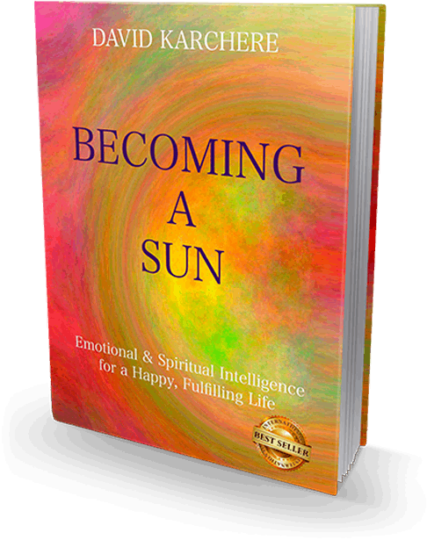What Is Emotional Intelligence?
And Why Does It Matter?
Imagine you are driving down a twisting mountain road. But fog surrounds you. Looking out your windshield, you can hardly see. You slow the car down to a crawl. Because even though you are confident in your abilities as a driver, and you know the car corners just fine, it’s a long way down.

Scientific Research and Beyond
What Is Emotional Intelligence?
So exactly what is it that we are talking about when we speak of emotional intelligence or EQ? Psychologist and author, Daniel Goleman, popularized the phrase in his 1995 bestseller Emotional Intelligence: Why It Can Matter More Than IQ. Since then psychologists, consultants, and authors have studied it, tested it, written about it, and taught it. There are almost as many definitions of emotional intelligence as there are people who speak about it. Some speak about the ability to manage emotions, about interpersonal skills, or the capacity for self-regulation. It is a relatively new field, and the understanding of the very nature of emotional intelligence is still forming. As I observe the field, there are two things I notice: • Most definitions of emotional intelligence fail to appreciate the part it plays in every facet of human experience • Emotional intelligence is like the weather. Many people talk about it. But no one seems to know quite what to do about—how to assist people in developing emotional awareness and becoming more emotionally intelligent.
The Global Relevance of Gaining Higher Emotional Intelligence
 Emotional intelligence is global in the sense that it affects people and the planet around the world. Think of the world scene. Don’t the emotional states of world leaders play a huge part in determining the future of the world? The lack of greater emotional intelligence leads to conflict and aggression, including all-out war. Certainly, there are other issues beyond emotional intelligence on the world scene—environmental issues, political issues, economic and financial issues. But behind them all there are issues of compassion, empathy, and care. We even refer to the cruel acts of war as heartless—lacking qualities of emotion that make someone a rational human being. These are issues of emotional intelligence that affect the well-being and the future of humankind.
Emotional intelligence is global in the sense that it affects people and the planet around the world. Think of the world scene. Don’t the emotional states of world leaders play a huge part in determining the future of the world? The lack of greater emotional intelligence leads to conflict and aggression, including all-out war. Certainly, there are other issues beyond emotional intelligence on the world scene—environmental issues, political issues, economic and financial issues. But behind them all there are issues of compassion, empathy, and care. We even refer to the cruel acts of war as heartless—lacking qualities of emotion that make someone a rational human being. These are issues of emotional intelligence that affect the well-being and the future of humankind.
Affecting All Phases of an Individual Life
Emotional intelligence is also global in the sense that it is relevant to all phases of an individual life. It shouldn’t be surprising, given that we live in an information age, and that we value the human mind so highly, that the role of emotion has been undervalued and out of balance. And so our world looks for solutions that are born from the mind—scientific solutions, and technological solutions, In a world that is so mentally dominated, our cultural view of the emotional body is that it is a problem. So we mentally manage emotions as we might our technology, or corporations, or as we might try to manage other people. As if our emotions are only an appendage we direct like we move an arm or leg. But of course, the reality is far more complex than that. Researchers, psychologists, and authors tend to speak of “handling emotions” or of “self-regulation” of a person’s emotional states. Emotional intelligence is seen as a way to improve job performance or enhance leadership skills. Or as a way to manage other people’s emotions. Aren’t we missing something? While that range of emotional intelligence is part of the human experience, it is only one phase of it. Here are phases of human experience that are often not seen as related to the level of a person’s emotional intelligence, but that are, nonetheless, profoundly affected by it:
• Stress
• Physical health
• Mental health
• Intellectual ability
• Self-esteem
• A person’s spiritual life
Emotional Intelligence and Spiritual Intelligence
Emotional intelligence is not just about mentally controlling what we feel. It is about liberating the deepest emotions at the center of the human heart. It is about setting the power of our emotions free, and in the process, unleashing the power of the human spirit. And what is that power? I respect any religious belief or spiritual path that makes someone a better person. What is universal is the power within the human spirit: the power to love, the power of compassion, the power of hope, and the power of wisdom and peace. And how do you free these powers without emotional intelligence? Emotional and spiritual intelligence are intrinsically related. It is virtually impossible to have one without another. Emotional intelligence is not about suppressing our feelings. It is about liberating them in their most intelligent form.
Teaching Emotional Intelligence
Another name for emotional intelligence is emotional understanding or an understanding of the heart. Here is what I’ve learned from conducting countless workshops and coaching sessions designed to develop emotional awareness. So many people don’t know what is going on in their own emotional realm, much less the emotional realms of others. They don’t know their own heart.
Sadly, they lack emotional understanding. They can’t name what they are feeling or admit it to themselves.
If you ask the average male how he feels, you are apt to get one of two answers: “Good.” Or “Tired.” And how can you manage something you don’t have eyes on?

It is like driving down that mountain road in the fog. But now the issue is not only navigating the world outside oneself. It is navigating the strong emotions that arise inside oneself.
What I have discovered is that the essential principles of teaching emotional intelligence are simple. It all comes down to this: the human heart responds profoundly to the thoughts of a kind, understanding person. Think about how it works for you. If you meet someone who is empathetic, caring, and understanding, you feel like opening up to them, do you not? It feels good to be understood. And you respond to that person. Now think about what it feels like to meet someone who judges you. They have negative, preconceived ideas about you. They look scornfully at who you are and how you live your life. Are you opening up to that person? Are you responding to them?
That is what it is like for the emotions of so many people. Their emotions are so used to being judged by the person’s own thoughts that they learned to hide. They shut down. They don’t reveal themselves to the conscious awareness of the person. And then, as if to get back at themselves they ambush the person when they least expect. Their anger roars. Their fear paralyzes. Their shame becomes a giant sucking sound taking them down. Typically, the person doesn’t know what is happening to them, or why. Their own human heart has become their enemy, or so they think. Have you seen it happen? Have you ever caught yourself in this pattern? If so, the answer is amazingly simple. Accept what you feel, no matter how terrifying. You would be surprised what happens. This is the basis of effective teaching of emotional intelligence.
Learning More About Emotional and Spiritual Intelligence

My name is David Karchere, author of the bestselling book, Becoming a Sun; Emotional and Spiritual Intelligence for a Happy, Fulfilling Life. It is a book of prose and poetry that guides the reader through an experience of their victorious human journey. It is a journey to grace, the ultimate emotional intelligence, and the highest spiritual knowledge.
It is the journey of Becoming a Sun—the spiritual path to becoming, on the outside, what we have always been on the inside: a being of radiant love and light. Here are three things I can suggest if you want to learn more about emotional and spiritual intelligence.
• Buy my book. I can promise it will take you on a wonderful learning journey. Click here to buy it on Amazon in the U.S.A. Or look for it on Amazon in your own country.
• Subscribe to my Becoming a Sun blog. Just click here.
• Attend my Becoming a Sun workshop. Click here for more information.
Emotional Intelligence and Spiritual Intelligence
Emotional intelligence is not just about mentally controlling what we feel. It is about liberating the deepest emotions at the center of the human heart. It is about setting the power of our emotions free, and in the process, unleashing the power of the human spirit. And what is that power? I respect any religious belief or spiritual path that makes someone a better person. What is universal is the power within the human spirit: the power to love, the power of compassion, the power of hope, and the power of wisdom and peace. And how do you free these powers without emotional intelligence? Emotional and spiritual intelligence are intrinsically related. It is virtually impossible to have one without another. Emotional intelligence is not about suppressing our feelings. It is about liberating them in their most intelligent form.
We all have strengths and weaknesses when it comes to our spiritual intelligence. To find out more about yours, try taking the Spiritual Intelligence Quiz on this website.

